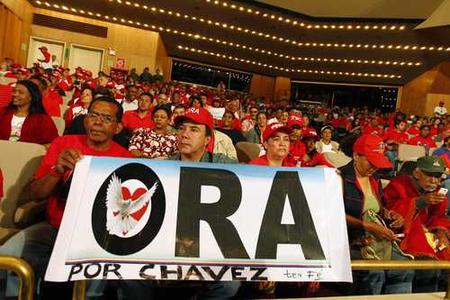President Felipe Calderón wishes Hugo Chávez a full and speedy recovery from cancer surgery, pays homage to Chávez’s hero Simón Bolívar, flirts with Chávez’s Bolivarian movement, and welcomes the CIA, DEA and other U.S. intelligence agencies into Mexico. Is the president guilty of a fraudulent double discourse, or is he maintaining a skillful balancing act?

When Hugo Chávez announced that he was going to Havana this week for treatment of a newly discovered intestinal tumor, the Mexican government sent him and “the people of Venezuela” a message wishing him a full and speedy recovery. The message, publicized by the office of Secretary of Foreign Relations Patricia Espinosa, expressed solidarity “with the people and government of the sister Republic of Venezuela.” The government of Mexico, read the quasi-diplomatic note, “manifests its desire that the operation is successful and that the Venezuelan leader fully recovers.”
Chávez later told the press that he had received expressions of solidarity, in writing and by telephone, from fellow presidents Ortega of Nicaragua, Mujica of Uruguay, Morales of Bolivia, Fernández of Argentina, and a letter from Felipe Calderón who, said Chávez, expressed “his solidarity with the people and government” of Venezuela.
Has the conservative government of Felipe Calderón joined the march toward 21st century Socialism? Hardly! But the Bolivarian movement of Hugo Chávez is more complicated than that, and there is a dimension of bolivarianismo with which conservatives like Calderón have identified: regional sovereignty and freedom from U.S. hegemony. Anti-imperialism has long been associated with the Latin American left, but the question of sovereignty resonates equally with many Latin American conservatives. While Calderón’s expression of “solidarity” with the Venezuelan government brings this paradox to the fore, it is not new.
This past December 2, for example, at the Teresa Carreño Theater in Caracas, Calderón opened the founding “presidential summit” of the Community of Latin American and Caribbean States (CELAC) with phrases that the radical Venezuelan president has long championed.
“Bolívar's idea is still in force and is common to all Latin American and Caribbean peoples," the conservative Mexican told the assembled heads of state and government. "I am convinced: This is the hour and this is the decade of Latin America, and we have to step up the pace toward integration.” It was in Calderón’s Mexico that the idea was generated at a preparatory meeting two years ago: an integrated community of 33 countries, all the sovereign states of the Americas except the United States and Canada.
Since Calderón took office, Mexico’s economic policy has been under the guidance of neoliberal economist Augustín Carstens, a one-time candidate to the presidency of the IMF. Nonetheless, some of the old neo-Keynesian policies of import-substitution industrialization (though not under that name), a subsequent expansion of the internal market through Latin American and Caribbean integration, and demand-driven growth have found favor in otherwise conservative policy circles. These policies reflect not only neo-Keynesian (demand-side) economics, but also neo-Bolivarian (regional cooperation) politics. Their usefulness helps to explain the attraction to right-wingers like Calderón and Chile’s Sebastián Piñera of regional alliances that keep their distance from Washington.
CELAC is one such alliance, and both Calderón and Piñera have joined energetically—though not, perhaps, as energetically as Chávez. “We are laying the cornerstone of unity, independence, and development,” said the Venezuelan leader at CELAC’s inaugural meeting. “The OAS is the old way, a space that was manipulated, dominated by the United States,” while CELAC “is born with a new spirit, as a weapon of political, economic, and social integration.”
Despite all this, Calderón has a long-practiced double discourse on Mexico’s relations with its neighbor to the north. As we have reported here before, his administration has welcomed the presence of the U.S. Office of Bi-National Intelligence (OBI), which occupies several office suites just a few blocks from the U.S. Embassy in Mexico City, and openly houses an alphabet soup of U.S. intelligence agencies. The operation of these U.S. agencies on foreign soil has been authorized by the Obama administration in a document called “A National Anti-Narcotics Strategy for the Southern Border,” and has been agreed to by the Calderón government.
Since late 2006, with the full knowledge and cooperation of the Calderón administration, the DEA has had at least 54 agents in Mexico, all registered as liaisons with the U.S. Embassy. These agents have no apparent restrictions on their activities beyond combating drug trafficking and organized crime, leading to suspicions—never proven—that they are in Mexico to conduct various types of espionage.
Is President Calderón playing a fraudulent self-contradictory game here, or is he simply looking out for his country’s permanent interests by keeping one foot in each (imperial and anti-imperial) camp? Either way, there’s no reason to doubt his genuine concern for President Chávez’s health because the presence of the keep-a-distance-from-Washington Bolivarian alternative—of which Chávez is the driving force—is useful to him, his position at home and his position in the hemisphere.
Meanwhile, Chávez says he is fit and ready to face the battle against cancer. “Let nobody be alarmed,” he told Venezuelans in a televised report to the nation, “and let nobody be gleeful because, independently of my own personal luck, this revolution has a direction that nothing and nobody can detain.”
For more on the Mexican drug war, read the May/June 2011 NACLA Report"Mexico's Drug Crisis." For more from Fred Rosen's blog, "Mexico, Bewildered and Contested," visit nacla.org/blog/mexico-bewildered-contested. You can also read NACLA blogs, Border Wars or Traffick Jam, for more on the U.S.-Mexico border or drug trafficking in the region.

